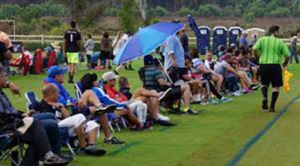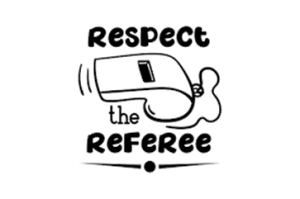Game day is exciting for everyone—coaches, parents, and, of course, the players. But how we behave on the sideline can make all the difference. Let’s talk about how coaches and parents can wisely use their time on the sidelines to support the players and the game.

1st Half:
Observe/Take Notes & Prepare for Half-Time Adjustments
Coaches resist the urge to shout instructions throughout the first half. Instead, observe and take notes. Watch how your players move, how they work together (or don’t), and what’s happening on the field.
You’ll be able to calmly point out a few things for your team to focus on in the second half. This way, your feedback is based on what you’ve seen instead of just what you feel in the moment’s heat.
FUNdamental Tip: During half-time, before talking to the team, talk to individuals, then pick no more than three positive things you saw in the first half to mention alongside your adjustments for the team.
2nd Half:
Coaches, Plan for Future Practice (The Theme)
During the second half, shift your focus to planning. Observe and Take Notes on recurring patterns and mistakes that need attention in future practices. Taking notes in the second half isn’t just about fixing immediate problems—it’s about preparing for the next steps in their development.
FUNdamental Tip: Note individual players’ strengths and areas for improvement. Personalizing your practice approach can help each player grow at their own pace.
Parents: Be the Calm Effect!

We know you’re just as invested in the game as the coaches and players,but how you behave on the sideline matters as much. Here’s a Golden Rule: Cheer for Effort! Your kids are trying their best, and they need to know that you see them working hard, not just scoring goals.

Sideline Etiquette
Walking up and down the sideline, following the play, and yelling instructions isn’t just distracting—it can be embarrassing for the players. Let the kids play without constant sideline interference. If you want to coach, consider getting certified!
If the game gets intense, stay calm. When parents get frustrated, it’s easy for the kids to pick up on that energy. Remember, they’re looking to you for cues on how to handle adversity. If you stay cool, they’re more likely to keep their composure on the field.
FUNdamental Tip: Before you shout something, ask yourself, “Will I be proud of this comment tomorrow?” A quick self-check can prevent unnecessary outbursts.
Respect Referees: It’s Not Easy Out There

The easiest thing to do on the sideline is to criticize the referees. Have there been many times when calls have been missed? Absolutely! And that can, unfortunately, directly affect the outcome of the contest. Outbursts from coaches/parents only signals to our players that they can blame refs for anything wrong. Blaming others is not a formula for success in sports.
For Coaches:
It’s easy to get frustrated by a bad call, but how you handle it is just as important as the call itself. If you need clarification, do it respectfully and at the right time (like at a stoppage or after the game). Don’t let emotions get the better of you. Your players are watching, and if they see you lose your cool, they’ll think it’s okay to do the same.
FUNdamental Tips:
- If a call goes against your team, model good sportsmanship. Teach your players to focus on what they can control.
- Make a point to thank the referees after the game, especially if things don’t go your way. It shows your players that sportsmanship matters, win or lose.
For Parents:
Cheering for your child is one thing, but getting into it with the referee? That’s a no-go. Remember, many of these referees are learning, just like the players. They’re going to make mistakes—just like your kids. So let them do their job and focus on cheering for your child’s effort and attitude, not the ref’s decisions.
FUNdamental Tip: If you really want to make a difference, talk to your kids after the game about how they handled tough calls. Help them see that what matters isn’t the referee’s decision but how they responded to it.

Your kids have been coached; now it’s time for them to play! Yes, they’ll make mistakes. That’s okay—it’s how they learn. Yelling instructions from the sideline only adds pressure and makes it harder for them to think on their feet.
FUNdamental Tip: Give your players the freedom to make decisions on the field. They’ll learn from their mistakes and become better players for it.

Final Thoughts
By following these simple sideline guidelines, coaches and parents can create a better atmosphere for everyone on the field. By using game time to observe, take notes, and offer constructive feedback (or positive cheers), we’re creating an environment where the players can grow, learn, and love the game.




